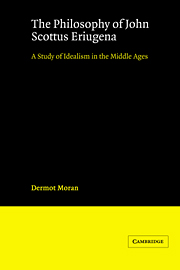Book contents
- Frontmatter
- Contents
- Preface
- Acknowledgments
- Chronology
- List of abbreviations
- 1 European intellectual culture in the ninth century
- 2 The predestination debate
- 3 Eriugena's life and early writings
- 4 The Greek awakening
- 5 The Periphyseon
- 6 Eriugena as philosopher
- 7 Eriugena's sources
- 8 Dialectic, philosophy, and the life of the mind
- 9 The meaning of human nature
- 10 Self-knowledge and self-definition: the nature of human knowing
- 11 The meaning of non-being
- 12 The meaning of nature
- 13 Eriugena's influence on later mediaeval philosophy
- 14 Conclusion
- Bibliography
- Index nominum
- Index rerum
13 - Eriugena's influence on later mediaeval philosophy
Published online by Cambridge University Press: 05 June 2012
- Frontmatter
- Contents
- Preface
- Acknowledgments
- Chronology
- List of abbreviations
- 1 European intellectual culture in the ninth century
- 2 The predestination debate
- 3 Eriugena's life and early writings
- 4 The Greek awakening
- 5 The Periphyseon
- 6 Eriugena as philosopher
- 7 Eriugena's sources
- 8 Dialectic, philosophy, and the life of the mind
- 9 The meaning of human nature
- 10 Self-knowledge and self-definition: the nature of human knowing
- 11 The meaning of non-being
- 12 The meaning of nature
- 13 Eriugena's influence on later mediaeval philosophy
- 14 Conclusion
- Bibliography
- Index nominum
- Index rerum
Summary
How influential was Eriugena in the development of philosophy in the High Middle Ages?
It is notoriously difficult to measure the exact influence of one author on another in the mediaeval tradition. The main intention of mediaeval authors was to represent the truth as they saw it, and they frequently used ideas without crediting them or showing any awareness that they were in fact borrowing from a different (and sometimes conflicting) intellectual system. In the case of Eriugena, his Periphyseon, Homilia, and Dionysius translations seem to have followed different paths and to have been sufficiently separated that no sense of an “Eriugenian” tradition developed in the Middle Ages.
Eriugena's complex and difficult system was not easy to grasp. Furthermore, it is clear that his work may have provided inspiration with individual thoughts and ideas, but there seems to have been no recognition that his thought constituted a “system” (of course, I do not mean a rigid deductive system of the kind which was popular in the seventeenth century) and that the ideas could not be simply separated out at random.
It is clear that Eriugena was widely read by a circle of followers in the ninth century, although the names of most of his immediate followers would not strike a chord of recognition among presentday philosophers. We know little of Eriugena's cooperator in studiis Wulfad, other than that he was a cleric at the monastery of Saint-Medard in Soissons, and that Eriugena may have spent some time there in 856–7.
- Type
- Chapter
- Information
- The Philosophy of John Scottus EriugenaA Study of Idealism in the Middle Ages, pp. 269 - 281Publisher: Cambridge University PressPrint publication year: 1989



